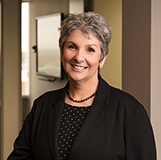Cheryl Bush Sworn in as a Regent of the American College of Trial Lawyers
Cheryl Bush, Founding Member of Bush Seyferth PLLC (BSP Law), was sworn in as a Regent of the American College of Trial Lawyers (ACTL) at the Annual Meeting on October 2, 2021. Bush will serve as Regent of the ACTL’s Region 9, which serves Michigan, Ohio, Kentucky, and Tennessee. As a Regent, she will also be assigned to several committees, including Advocacy in the 21st Century, Attorney-Client Relationships, Distinguished Pro Bono Fellows, and the Emil Gumpert Award Committee. Her term began on October 2, 2021, and will last through the 2025 ACTL Annual Meeting.
Bush handles high-stakes cases across the country and has won 95% of her jury trials. She is actively involved in the National Association of Minority & Women Owned Law Firms and is a Senior Life Fellow of the American Board of Trial Advocates. Bush is also a member and Former Vice Chair of the Product Liability Advisory Council. She received her J.D., cum laude, from the University of Michigan Law School.

Bush Seyferth PLLC
PLAC’s Mike Zogby Speaks with Law360 about NJ’s Proposal Regarding 3rd-Party Funding Disclosures
April 27, 2021
Law360 turned to PLAC member
Michael C. Zogby of Faegre Drinker for insight about the U.S. District Court for the District of New Jersey’s recent proposed amendment to its local civil rules, which would require litigants to disclose the identities of outside funders and whether they have input on litigation decisions. Zogby, deputy leader of the firm’s product liability and mass torts practice and co-chair of the health & life sciences litigation team, shared commentary with associate
Kaitlyn Stone.
Zogby told Law360 that he believes the court has the chance to be a leader in terms of third-party litigation funding disclosure with its proposed rule change. “We have so many large-scale, important mass actions right now that this is a perfect example, and timetable, for the court to put in transparency and disclosure guidance to really help with the cases that are being filed in the district,” he explained. “It’s long overdue nationally, but this does show that the District of New Jersey is ahead of the curve in making sure that a rule is on the books.”
Kaitlyn Stone, one of PLAC’s emerging leaders, agreed with Zogby, saying “It’s just another example of the District of New Jersey being on the forefront of an issue. They really are on top of issues, and even if we would have liked to have seen it a bit earlier, they still are ahead of the curve in terms of what’s been happening nationally.”
Read their full commentary here (subscription to Law360 required).